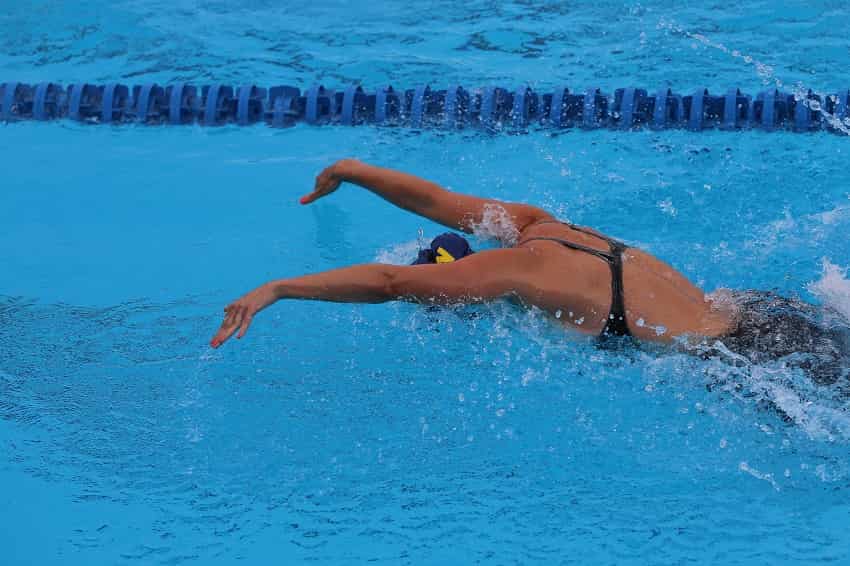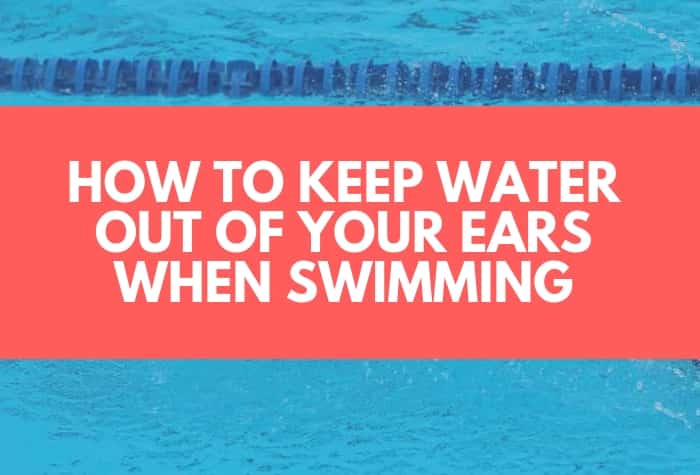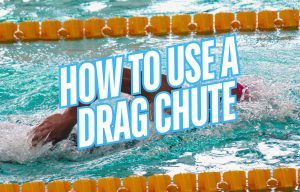Ready to take the plunge at the pool, but want to avoid swimmer’s ear? Here’s a proven plan for keeping water out of your ears while swimming.
Swimmer’s ear, not to be confused with a middle ear infection, is inflammation of the external ear canal.
It’s a bacterial infection that happens from swimming (duh!), whether at your local pool or even sweating excessively.
Although swimmer’s ear is most prevalent among young adults and children, with the Center for Disease Control citing 2.4 million annual healthcare visits for swimmer’s ear, adults certainly are not immune.
The swimmer’s ear can be infuriating, leaving swimmers jumping up and down in the locker room after practice, with their heads tilted to the side. Water can linger in the ear canal, causing temporary hearing loss.
And, of course, there is the nagging itchiness, inflammation, yucky leaky discharge, and pain as the bacterial infection runs its course.
Since my first earache as an age-group swimmer, I’ve tried all sorts of home remedies and tricks, from candle wax to vinegar to pouring hydrogen peroxide in my ear canal after bursting my eardrum (one of the most painful moments of my life).
There are also plenty of effective ear drops specifically formualted for dealing with swimmers’ ears.
Of course, when dealing with swimmer’s ear, the best defense is a good offense.
If you know you are more prone to earaches, there are some very simple things you can do to keep water out of your ears when swimming.
Here’s how to protect your ears the next time you head to the pool.
1. Wear swimmer’s ear plugs.
Ear plugs designed for lap swimming—the silicone putty ones that can be custom shaped to your ear canal, keeping water out of the ears—have been a life-saver for me in the water.
As a lifelong competitive swimmer and earache “enthusiast” I’ve experimented with just about every type of ear plug under the sun. From expensive, customized ear plugs to the ear plugs that every popular swim gear manufacturer puts out, I’ve worn them all.
The one that has worked for me the longest is Mack’s Silicone Soft Putty earplugs.
They are soft, moldable ear plugs that shape to the unique shape of your ear.
Pro tip: To get a snug, leak-free fit with swimmer earplugs, warm them in your hands for a few minutes before wearing them. Warming the earplugs will make them more pliable and form-fitting while wearing them. On cold, winter days when my hands are chilly, I will put the earplugs under the hand dryer in the locker room for about 30 seconds to warm them up. I find doing this about ten minutes before putting them in works best—don’t heat them up under the blasting heat and then shove them straight into your ear, lest you run the risk of torching your ear.
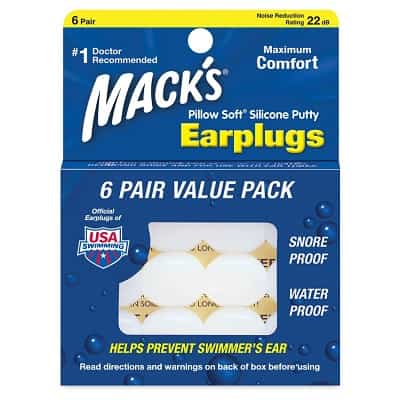


2. Gently dry ears with a hairdryer post-swim.
Does your pool have a hand dryer in the locker room? It likely does. Put that bad boy to use by turning it on and putting your ear about a foot away from the dryer.
Set the heat to low if possible and keep a safe distance when doing this—the goal isn’t to scald the sensitive insides of your ear canal. Think warm breeze, not hot blast.
3. Avoid the urge to jam cotton/fingers/tissues in your ear.
So, you’ve taken precautions, like wearing earplugs, and some water still got in there. Awesome, right?
Not really. The urge to ring out your ear canal with the tip of your finger will be oh-so tempting, especially when it feels like if you just…rub it…a little…it will go away.
Stuffing foreign objects into the ear canal means you are likely to scratch something, introduce more bacteria, and simply stuff wav and water that is trying to come out back inside.
Although it might feel satisfying to get ear wax out of the ear canal, it actually protects your ear canal from infection.
4. Don’t rely on swim caps to keep water out of your ears.
Swim caps do not keep water out of your ears.
Which can be an odd thing for the newbie swimmer to read.
But swim caps, in a lot of ways, are a bit of an enigma:
Although they cover your head, they don’t keep your hair dry.
And although they can cover your ears, they won’t form a watertight seal, meaning that water will get in between your cap and the head if you submerge your head for any kind of meaningful amount of time at the pool.
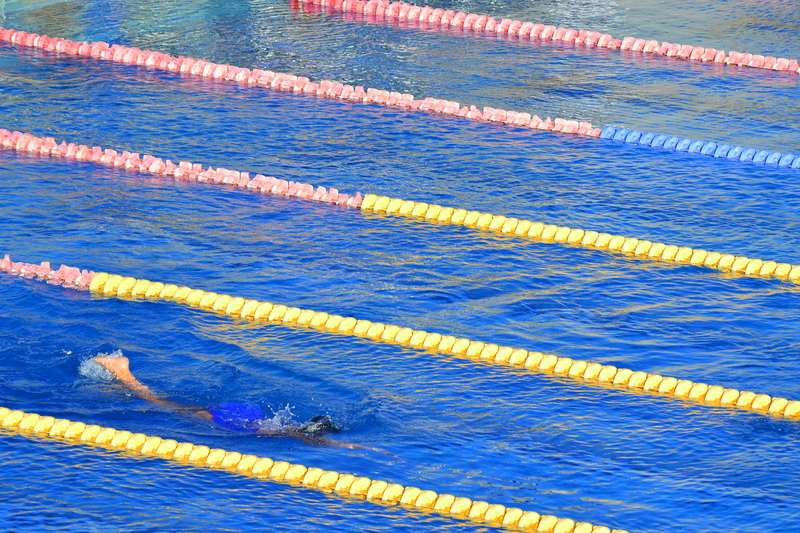
I’ve found that swim caps are helpful for keeping ear plugs in place, and the functions of a regular swim cap (it keeps your hair from clogging up the drains and floating across the pool, protects it from getting drenched in chlorinated water, and swim caps can be hydrodynamic as it relates to more serious swimmers), but they are not great for keeping water out of your ears while swimming.
So no, if you are wondering if swim caps keep water out of your ear when swimming, they almost completely do not.
5. Use a swimmer’s ear band to help block water
Swimmer’s ear bands are designed to wrap around the head and shield the ears from water.
Although swimmer’s ear bands are best suited for incidental water (water splashing into the ear canal, for example), they do not provide the same type of complete blockage that happens with earplugs.
6. Hydrogen peroxide to dry and clean the ear canal.
If you’ve never used hydrogen peroxide before, you are in for a treat. Placing a couple drops into the canal (lay on your side so that it drops completely downwards), you will soon hear a slight fizzing and cackling sound in your ear, which can understandably be disconcerting the first time around.
After about thirty seconds tilt your head back so that the ear canal is facing downward and allow the solution to run out. Place a towel on your pillow to catch the run-off.
Disclaimer: Before putting any type of ear drop into your ears, consult with your family physician. Safety first!
Frequently Asked Questions About Getting Water Out of Ears After Swimming
How do Olympic swimmers keep water out of their ears?
For the most part, Olympic swimmers (and every other swimmer!) can swim without using earplugs or covering their ears.
That is because the ear canal is designed to prevent water from passing through the eardrum. The exterior of the ear canal (which you can touch with your fingertip) ends at the eardrum, which seals off the canal, keeping water out.
For swimmers who experience frequent earaches (infections in the outer ear canal), or who have perforated eardrums (meaning water will seep by the eardrum), they will rely on earplugs to keep water out.
Olympic swimmers do not wear caps to keep water out of their ears. Swim caps are largely worn by Olympic swimmers to keep their goggles from sliding around when diving in, to keep hair out of their eyes, and to reduce drag as much as possible.
Do swim caps cover ears?
There are some swim caps that can wrap over the ears, but they are not 100% going to stop water from going into your ears.
They are helpful for the head-above-water swimmer who simply wants to keep any water from splashing into the ears, like people doing water aerobics, water jogging, doing head-up breaststroke, or simply lounging by the pool.
But for swimmers dunking their head into the water, swim caps do not stop water from accessing the ear canal.
What happens if water gets in my ear when swimming?
Water that enters the ear canal while swimming will drain out on its own, either bonding with mucus and being secreted over time via ear wax, or manually by tilting your head.
And for almost everyone, when water goes in the ear, it comes back out after running up against the ear drum.
Water that is left in the ear canal can end up causing outer ear infections (swimmer’s ear) from bacteria that is in the water. The ear canal is a warm and humid place; fertile ground for bacteria to grow.
When water gets on the inside of the eardrum, it’s because a) water goes up the nose and it trickles down the Eustachian tube or b) we have a perforated eardrum that allows water to trickle in past the eardrum when it enters the outer ear canal.
For the latter, you will want to be careful when around water and always wear earplugs when swimming.
Wrapping It Up
Swimming is one of the most enjoyable ways to spend your time, whether it’s splashing around, doing cannonballs, or swimming laps and chasing new personal best times.
Getting water in your ears? And the earaches and misery that can accompany them? Not enjoyable.
The next time you hit the pool, take some simple precautions, wear ear plugs if you tend to get ear aches, dry your ears out when you get out of the water, and make the pool a place to swim free of ear aches!
As always, consult with your family doctor if you are experiencing pain or if there is discharge from the ear.

